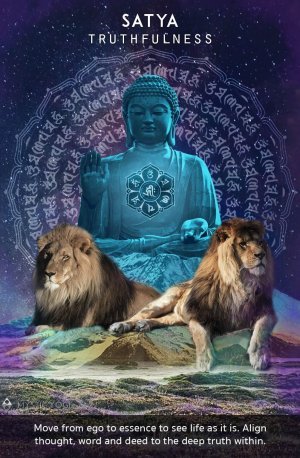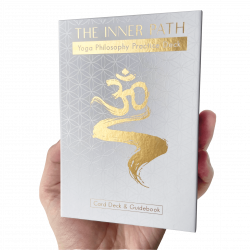
Definition: From Sanskrit, with ‘a’ meaning non or without, and ‘hiṃsā’ meaning violence.
Card Symbology:
The flower of life is a universal geometry, revealing that everything in the universe shares an underlying sameness. Living harmoniously with all our relations is the foundation of spiritual culture, where the love between humans and other species is pivotal. Elephants are highly empathic – connected to those they love across distances and willing to protect the weakest members of their herd.
“Non-violence is not a garment to be put on and off at will. It’s seat is in the heart, and it must be an inseparable part of our being.”
— Mahatma Gandhi
2.35 ahimsa pratishthayam tat vaira-tyagah
As a Yogi becomes firmly grounded in non-violence and non-injury (ahimsa), other people who come near will naturally lose any feelings of hostility. — Patanjali
Exploration:
All the yama and niyama (yogic observances) have both obvious and subtle meanings, this is especially true for Ahimsa. Non-violence extends to thought, word, and deed – a state of consciousness that doesn’t seek to harm others in any way. While many of us may immediately think that we’re non-violent, careful introspection will reveal that subtle forms of violence often weave themselves throughout what we think, say, and do.
One of the most prominent forms of violence we experience is within our own-selves. Our harsh criticisms, judgments, and lack of self-worth create conditions where we beat ourselves up or mentally attack others. We forget that beneath the surface, we all have the desire to love and be loved. Lack of self-love leads us to twist our behaviour to meet these needs in a way that never truly satisfies them.
What is outside of you is a reflection of what is inside of you; most difficult yet crucial personal growth involves taking complete responsibility for everything that happens in our lives. The way you treat people and all other living creatures is a testament to your inner state. As your consciousness expands to include more of the world and its situations, you’ll begin to see how every thought and action affects the whole. This humbling realization leads us to be more compassionate and discerning as we realize that we must, in the words of the great non-violent activist Mahatma Gandhi, “Be the change we wish to see in the world”.
Story:
One morning, when meditating by a stream, an old man opened his eyes and saw a scorpion floating helplessly in the water. As the scorpion was washed closer to the tree, the old man quickly stretched himself out on one of the long roots that branched out into the river and reached out to rescue the drowning creature. As soon as he touched it, the scorpion stung him. Instinctively the man withdrew his hand.
A minute later, after he had regained his balance, he stretched himself out again on the roots to save the scorpion. This time the scorpion stung him so badly with its poisonous tail that his hand became swollen, his face contorted with pain.
At that moment, a passerby saw the old man stretched out on the roots struggling with the scorpion and shouted: “Hey, what’s wrong with you? Only a fool would risk his life for the sake of an ugly, evil creature. Don’t you know you could kill yourself trying to save that ungrateful scorpion?”
Without taking his eyes from the scorpion the old man replied, “My friend, just because it is the scorpion’s nature to sting, that does not change my nature to save.”
Ahimsa, in this sense, is more than a passive virtue that just means abstaining from violent actions. In it’s active expression, ahimsa is rooted in the urge to protect. When we see an animal in distress, our willingness to help it is an activation of ahimsa.
When we are overcome with strong negative emotions we become like a scorpion. The old man is the part of us that is filled with wisdom and compassion, willing to reach out and experience the sting of the scorpion if that means it can be brought safely to the shore. Once we become confident in this aspect of ourselves, that is rooted in our inherent nature of basic goodness, we are not afraid of scorpions in our life.
In fact, scorpions become an opportunity for us to exercise the aspect of our nature that seeks to help and heal.
Get a shot of wisdom in your inbox - receive a daily yoga card with a mini video meditation for 7 days.
Related terms:
Carry the wisdom of yogic science wherever you go with this yoga oracle and practice deck : featuring 26 art cards and wisdom guidebook.





